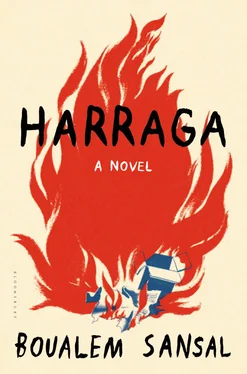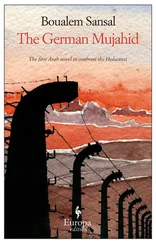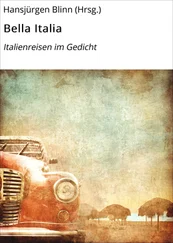The Triple Function of Linear Time
I was
I am
I will be
Three stories to make you laugh, cry and blow your nose
I was
I am
I will be
Three times to sleep, wake and wash
I was
I am
I will be
Three words to say, to greet and disappear
A day
A year
A century
Three silent bars and four times three: zero
This is all I have managed to write in two weeks, and it’s rubbish.
It is impossible to return to old habits after leaving them behind. We don’t know how. Here I was, playing a role I knew by heart and botching it, faltering, overacting or underacting. I found myself stopping in mid-scene, repeating myself, flailing around for help. To be condemned to watch yourself live is a terrible thing, I found myself criticising every move, every word. I found myself ugly, I hated my voice, loathed the way I look, was sickened by my wounded-animal expression. I felt ill, I was stammering, I was thinking in black and white. Yes, that’s it, I was a robot, hypnotised by its reflection in the mirror.
In reality it was different, I was afraid, terribly afraid, I plunged back down into the solitude thirty-six floors below. It was too much, God Himself would have been unable to resist. I curled up in a corner, turned my back on the world. Then, suddenly, I leapt to my feet, threw open the windows and sucked in lungfuls of air. I was not about to bury myself alive. No, no, absolutely no way!
I needed a new life, I needed to extemporise, to bounce back, I needed a plan.
The first idea that occurred to me was to leave, to go abroad. I wouldn’t be the first or the last to go, and certainly not the only one to think about it. I toyed with the thought and then rejected it. Too complicated, it’s an obstacle course, a sea of paperwork, it’s humiliation at every turn. Passport, visa, black-market currency, residence permit or political refugee, finding accommodation, applying for social security, registering for this and that. Furtive meetings in corridors with bright sparks who’ve managed to pass the test. The endless waits, the rigorous screening process, the countless questionnaires, the suspicion you could cut with a knife, the smart-arse computers at every fingertip and in the end, when you finally think you might have reason to hope, the guillotine, the trap door, the categorical niet . And my heart stops. Or I end up killing the woman behind the counter, get branded a terrorist only to have the authorities go easy on me for fear of reprisals by some terrorist cell lurking in the suburbs while the newspapers rally to my cause for as long as I can hold their interest. Dear God, the things people think of. Here in Algeria, people would see me as a coward, a traitor, a girl looking for a good time; over there, they would see me as an interloper, a liar, a benefit scrounger and I don’t know what else, they would glare at me with my bundles and my hangdog expression. They would refuse to believe I was persecuted by the State and its religion. They would laugh in my face. No Muslim has the right to complain about religion, about petty tyrants; we are seen as collaborators, accomplices or willing victims, or worse, we are unassimilated Muslims who require close surveillance. I would go insane before I could work out what they thought of me.
Move to another neighbourhood, another town? Hah! On short journeys, your troubles and your griefs end up being packed into the removal van with you.
And besides, who said I’m prepared to leave my house? It would kill me: my house and I are bound by blood ties.
Silence was the only solution. No ideas, no noise.
Get yourself married and take each day as it comes! What? Who said that? Husband, hardship — any other bright ideas? A Zorro in my house, Muhammad and his whole family breathing down my neck and the imam keeping an eye on me from the minaret, no fear! Can you imagine me waiting around for a husband to cut my throat instead of shaving? Can you imagine me taking him by the hand and teaching him everything? The men of this country never really recover from their childhood, as you well know. I sometimes wonder if they’ve got all their teeth. I don’t understand their fixation with touching everything, with putting things in their mouths. And I’m telling you, I feel like grabbing a knife when I see them scratching their balls, picking their noses at the steering wheel, scratching their arses as they walk, spitting as often as breathing. Even Mourad, cultured as he is, is a good for nothing, he’s the last man I’d think of marrying. He can’t even find Chérifa for me.
I’m reminded of the film Not Without My Daughter. The satellite channels play it on a permanent loop. Will an Algerian TV station ever broadcast it? Not this century, certainly. It tells the story of an American woman married to an Iranian who, finding herself trapped in Teheran when her husband abducts their child, is forced to challenge the Islamic Republic of Iran, its men, its women, its Revolutionary Guards, its preposterous laws, if she is to be free. I’ve seen the movie ten times and I can’t understand how something so absurd could happen to an American.
It begins in the States. Our couple are cuddling in a dream house on the shores of a beautiful lake. A little girl, all dimples and giggles, is chasing after a ball of fur that yaps delightedly. The man — the Iranian — is trying to persuade his beloved to go with him to his home country for a two-week vacation with his family. He talks about it as a pilgrimage which will make their love stronger: ‘You’ll see, they’re charming, they’ll make you very welcome,’ and so on and so forth. The woman refuses point blank. The man insists, like any good son who longs to see his parents and to introduce them to his wonderful family. At the end of Act I, the miscreant has succeeded in his fiendish plan and we find ourselves in Teheran, in a Third World city in a profoundly deprived neighbourhood in a gloomy house. It’s like a descent into hell. The chador , the doors of the harem closing one by one, the increasing surveillance, the warnings, the glowering patriarch, his harpy of a wife constantly finding fault, the uncles criticising, the cousins gesticulating, the wives whispering and rolling their eyes in joyful submissiveness while outside the streets are teeming with Revolutionary Guards. What can she do now that the trap has been sprung? Will she lie down and die as we do? Will she weep and wail? Accept her subservience? No, she is a daughter of America and hence a woman of action. In the second part, we watch as the American woman plays a long game, she wears the chador , bows and scrapes to the men, huddles in dark corners with the women, washes the feet of her husband and of the patriarch, breathes discreetly, blindly obeys the harpy, smiles happily at her daughter who is also beginning to wither away (God, how beautiful she is in her little black shroud). She plays the happy Muslim wife in chains, uses oceans of purifying water, but whenever she can, she slips out of the house, she runs, she ferrets around, she phones people and, after almost superhuman effort, finds a route by which she and her daughter can leave Iran. And then, one sweltering afternoon, she snatches her daughter and flees. There is a chase sequence that takes us all the way to northern Iran, to the Turkish border at the foot of Mount Ararat. Her (by now ex-) husband and his clan stumble after them. Oh, the blind fury as they shriek at each other, tear at their djellabas , splutter with rage; they feel deeply humiliated. We are convinced that… and then suddenly we realise: they don’t want to kill her, THEY WANT TO BRING HER BACK TO THE HOUSE ALIVE! Oh no, dear God, anything but that! With a mixture of dread and relief we watch as our heroines trek the last few miles and, when they see the star-spangled banner fluttering above the American consulate in Turkey, I wept as only happiness can make us weep.
Читать дальше












